Music & Concerts
Greyson Chance: A Butterfly’s Journey from Holy to Hell and Back
A decade ago there was a boy made famous by a pop song and a viral video. Today, there is an artistic, powerful singer song writer
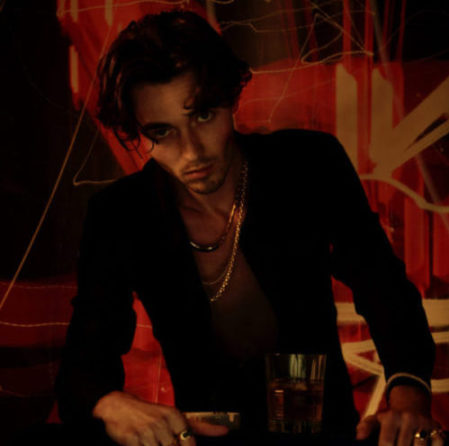
HOLLYWOOD – Many want to saddle singer Greyson Chance with the label “comeback” or having a “return from retirement.” It is an understandable mistake as the “fame to disaster” narrative IS there. The real story is about one of the most exciting new artists of today. One that speaks to not only the LGBTQ youth of today, but of their entire generation.
Over a decade ago, there was a boy. The boy was very gifted at the piano, and at singing. He entered a talent contest and belted out a well known pop song by one of the trendiest artists of the day. Of course, there was a video. Social media was itself an infant, and as such, started launching like videos into the stratosphere. His video was one of the first to be seen gazillion of millions of times. Then there was the Ellen show, then the record contracts and a music video where he was Ariana Grande’s love interest.
Life would never be the same again. It would not be the same as Greyson Chance would be forever entwined with Lady Gaga and Paparazzi. It would not be the same as when his voice changed and it all came crashing down. “The second that the momentum stopped, you know, I truly was just sort of thrown to the curb when I was 15. I, all in the same day, got dropped by my record label, my management, my publicist, and my agent. It was the ultimate for me, as a child musician.” Greyson told me.
The real story however, is of a fantastic singer/songwriter who hit the industry in a big way with a debut album of his own work in 2019. He emerged then as a honed artist who had already been educated on the workings of the industry, and as a professional who knew how to walk in with his own vision and make it happen.
“It is a machine and, when I when I came on the scene originally, I had this huge viral video and with that, a lot of money coming around, and big players kind of involved in the industry,” he says. He made music their way. He did the songs they wrote, and played the part of the person they wanted him to be.
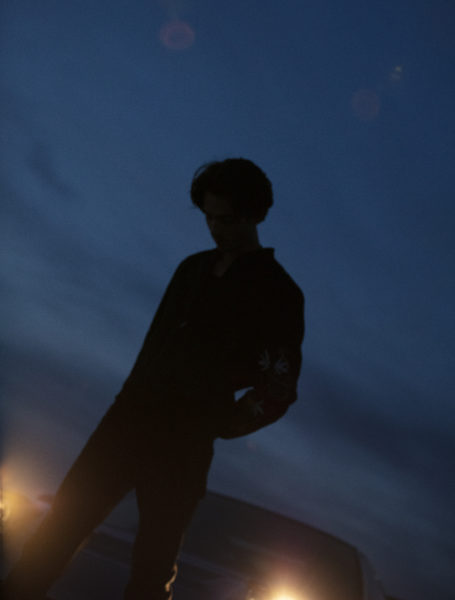
He learned how to be the kind of artist he did not want to be. The young artist went back to Oklahoma and enveloped himself in the cocoon of normalcy. He incubated there, fell in love, and had his heart broken by someone he thought he was going to hold onto forever. At that point, he emerged from the cocoon, with a full self-written album in hand, a musical butterfly spreading his wings.
“I’m 23 years old right now. And I started off with my first record deal when I was 12 years old. There was so much of my adolescence, in my childhood in music, where I wasn’t given the chance to not only make music that I really wanted to do, but also to be writing. I was being forced to do records, I didn’t have a huge artistic involvement in anything I was doing. So when I came back into music, I really wanted to finally show the world that I was a songwriter, that I had a unique voice. That I had some unique things to say. I really emphasize authenticity. These are stories that are coming from the heart. These are things that are coming from my own life. It’s not even really a choice that I have anymore. It is honest, from a place that’s true and genuine,” Greyson states.
Greyson represented not only with a new thematic “voice”, but an actual new physical voice as well. “It was interesting, what I went through, they always tell you that when your voice changes, it’s going to be sort of a tough go and that is such an understatement. It was so hard for me for a few years to really kind of find comfortability in my physical voice again. I mean, I really struggled through my voice change. But ultimately, I learned as a kid when I was on the road that in a way, when you’re a touring musician, you’re sort of like an athlete. My muscle is, is my voice.” Greyson’s new voice is far superior to his belting-out-broadway boy voice. He has a harmonic high register, and a sultry deep one. It copies no one else’s, this voice is uniquely his own.
In 2019, Greyson came out with his launch album “Portraits”. The stories of the album gave vision to the various personas he saw of himself as he navigated an ill fated romance. One week, he was looking at engagement rings, the next week, out of the blue, “the man of his dreams” left him without explanation. Greyson works each personal portrait into the prism of a beautiful, musically shiny diamond. “Portraits for me was truly my reinvention piece. And what I mean by that is, at the time before I put out that album, you know, I couldn’t even get a meeting in LA with anybody. You know, no one wanted to touch me, no one wanted to be involved in in my project and involved in my music. So I told myself, You know what, I’m going to write a record, and I’m going to write a full album. I’m going to give this one last shot, and see, see what happens. And, fortunately, it went over very, very well.”
In 2019 he filled 109 venues performing the songs from Portraits. He publicly came out as gay in response to a fan during a conversation about living authentically. He has also been transparent about his personal challenges, including his on-going battle with anorexia. “It was truly very, very difficult to diagnose it. I had come off of this really bad breakup that I wrote my album Portraits about, and I was developing habits of not eating and not taking care of myself. I blamed it on the sadness I was feeling at the time. Then, as things became a little more normal, and I became a bit more stable, I noticed that I still had had this issue and things that were going on. For me, I had to work through a lot of therapy, to get a grasp on it. I brought it public because it was so stigmatized, and still is. I like to think that I have my life together. But here’s the deep issue that I struggle with, and I go through. I’m on a road to recovery, it’s never ending when you are battling with an eating disorder, but I’m doing very, very well right now. I’m staying on top of it. Through my disclosure, there was such an amazing and beautiful dialogue that keeps happening, people reaching out to me and sort of sharing their own struggles and battles with it as well. I’m working on trying to be the best version of myself that I can be.”
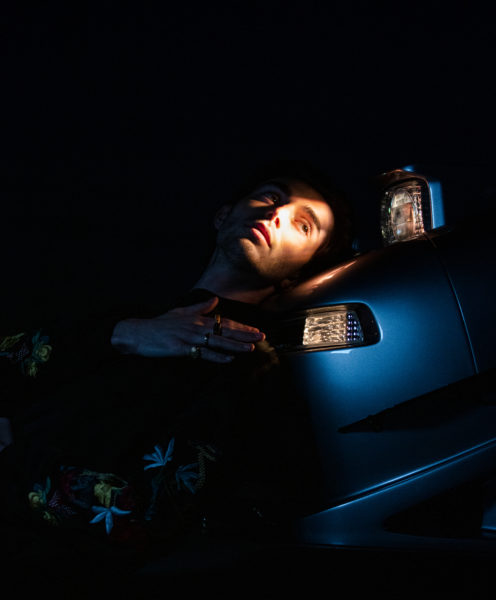
After a forced lockdown during the pandemic of 2020, Greyson is ready to move into the next phase of his butterfly trajectory. He has released two singles off his next EP, Trophies, and he is in love again. The songs on the EP will be in a thematic composition. The two first released create a spiritual arc from the heavenly rich ballad-like Holy Feeling to the high-pop danceable hedonistic Hell Boy.
He says of the new material, “My boyfriend and I just celebrated our one year anniversary yesterday. Trophies, is really expressing the fear of now losing love, and sort of that fear that was created in the old relationships that I’ve had. It is the desire for my fans and queer people around the world to know what truly being in love is. We’re constantly told as, as queer people that, our relationships are always going to be rocky, they’re never going to be sort of American Dream type relationships. Because we’re different, these relationships are going to be different, because we’re inherently different. That is just absolutely BS. Regardless of how you identify who you love, you can totally have all of this stereotypical white picket fence, you know, dog in the backyard green grass type of thing. It is so within your wheelhouse. It’s not out of reach. This record is emotionally going through all those those things, and talking about them in the music.”
A decade ago there was a boy made famous by a pop song and a viral video. Today, there is an artistic, powerful singer song writer who sings the authenticity of his generation. The rush you feel is the wind from rainbow colored butterfly wings taking flight, and the knowledge that the most famous Greyson Chance is the one yet to come.
Arts & Entertainment
IN PHOTOS: Emily Eizen captures the glam at OUTLOUD
‘This year felt different because we are different. We are more empowered, galvanized and out, louder than ever’

All photos are credited to Emily Eizen for Los Angeles Blade.
WeHo’s Pride last weekend hit off Pride month for everyone across L.A., bringing major headlining acts to our backyard through the OUTLOUD Concert. Conveniently located a few blocks away from my West Hollywood apartment, every year I would hear performances booming from a distance. This year brought a lighthearted revelry of queer music performed by artists who are a part of or allied to the LGBTQ community. However, having inside access thanks to Los Angeles Blade and my dear friend Laganja Estranja (love you sis), I tapped right into the beating heart of West Hollywood, the queer music scene and a deeper sense of community — during a time when our joy and celebration are being banned and demonized. This year felt different because we are different. We are more empowered, galvanized and out, louder than ever.
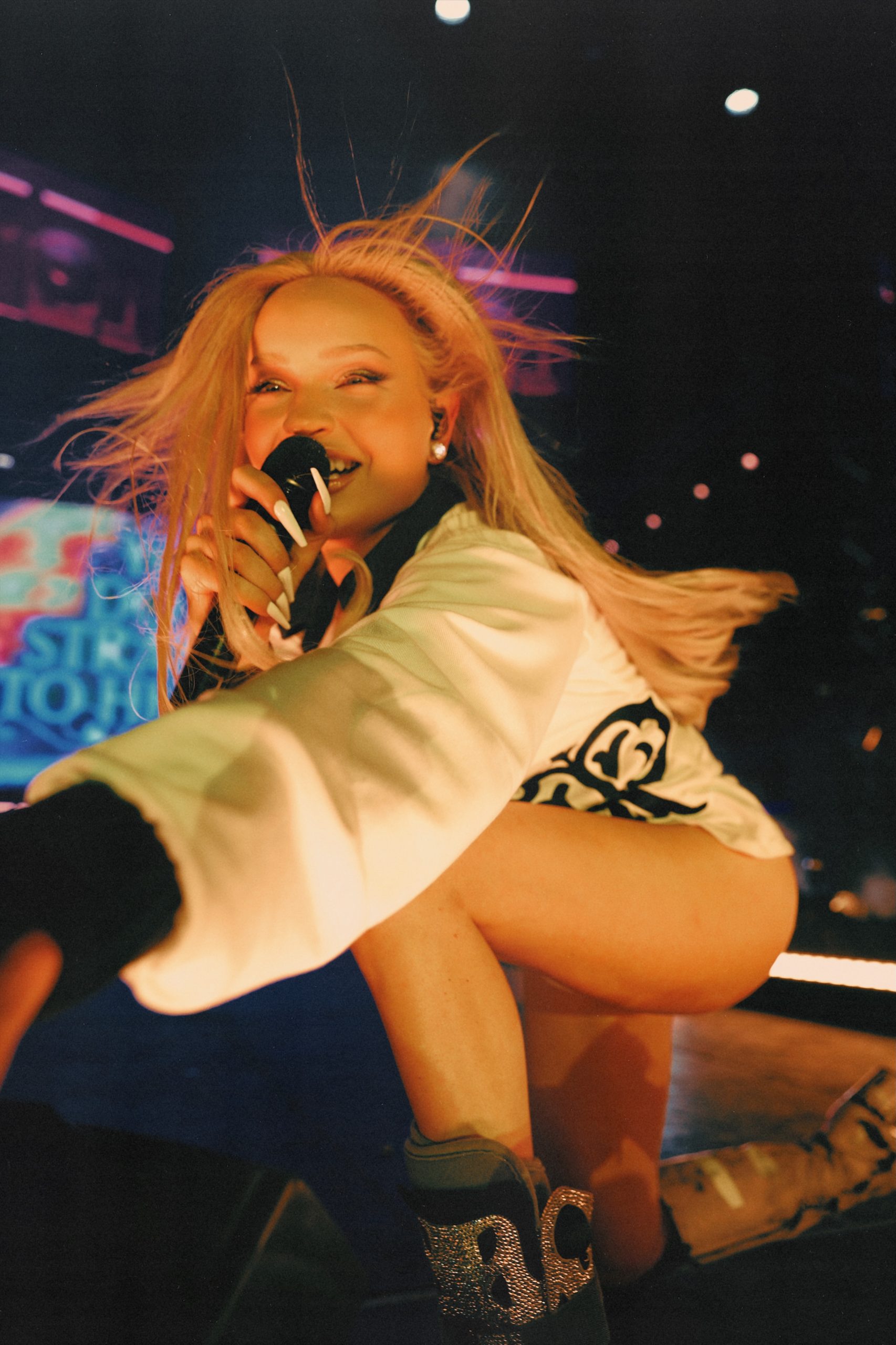
Kim Petras reaches out to fans during her Saturday night set.
Between musical acts and hurried backstage commotion, I found myself dressed in my best finery, with freshly dyed eyebrows and bleached roots to really set it off. While I had my usual pre-show jitters, I actually felt calmer than ever before because I was surrounded by family waiting to be met and connections to be made. Sure enough, with each person I met and asked to capture, a sense of belonging and creativity washed over me.

DJ Hannah Rad pumps up the crowd between sets.
Friday Night, During the Kickoff, Laganja and I kiki’d with lesbian queen Kori King, the “Legs of New York” Lana Ja’rae, and RuPaul’s Drag Race All Stars 10 star Acid Betty. Not to mention the ever present SLAY of the masters of ceremonies Ryan Mitchell and Arisce Wanzer, who flawlessly ushered us throughout the whole weekend, generously offering an introduction or a quick sesh between acts. Qveen Herby closed out the night, reminding the crowd — and myself — that the world needs our art.

Qveen Herby lights up Friday Night.
Saturday was a whirlwind, starting with me meeting pop-rock girlie pop Chrissy Chlapecka, who I captured on my fisheye lens. That session something clicked, I decided I was going to get as many fisheye portraits as I could. Not in a “can I take your photo k-thx-bye” kind of way, but in a “I would love to capture your unique and beautiful slay because I see you” kind of way.

Hip Hop duo FLYANABOSS pose wearing @ColtyLeather.
I linked up with the hiphop powerhouses FLYANABOSS, whose charisma practically shattered my camera. During their set I spotted Veondre Mitchell and I snapped a gorgeous photo of her being a barricade baddie as we exchanged compliments. In the artist area, which started to feel like a mini gay Coachella, I met the electrifying Frankie Grande, and met up with one of my best friends, Luna Lovebad, who happens to be the genius behind my new look.
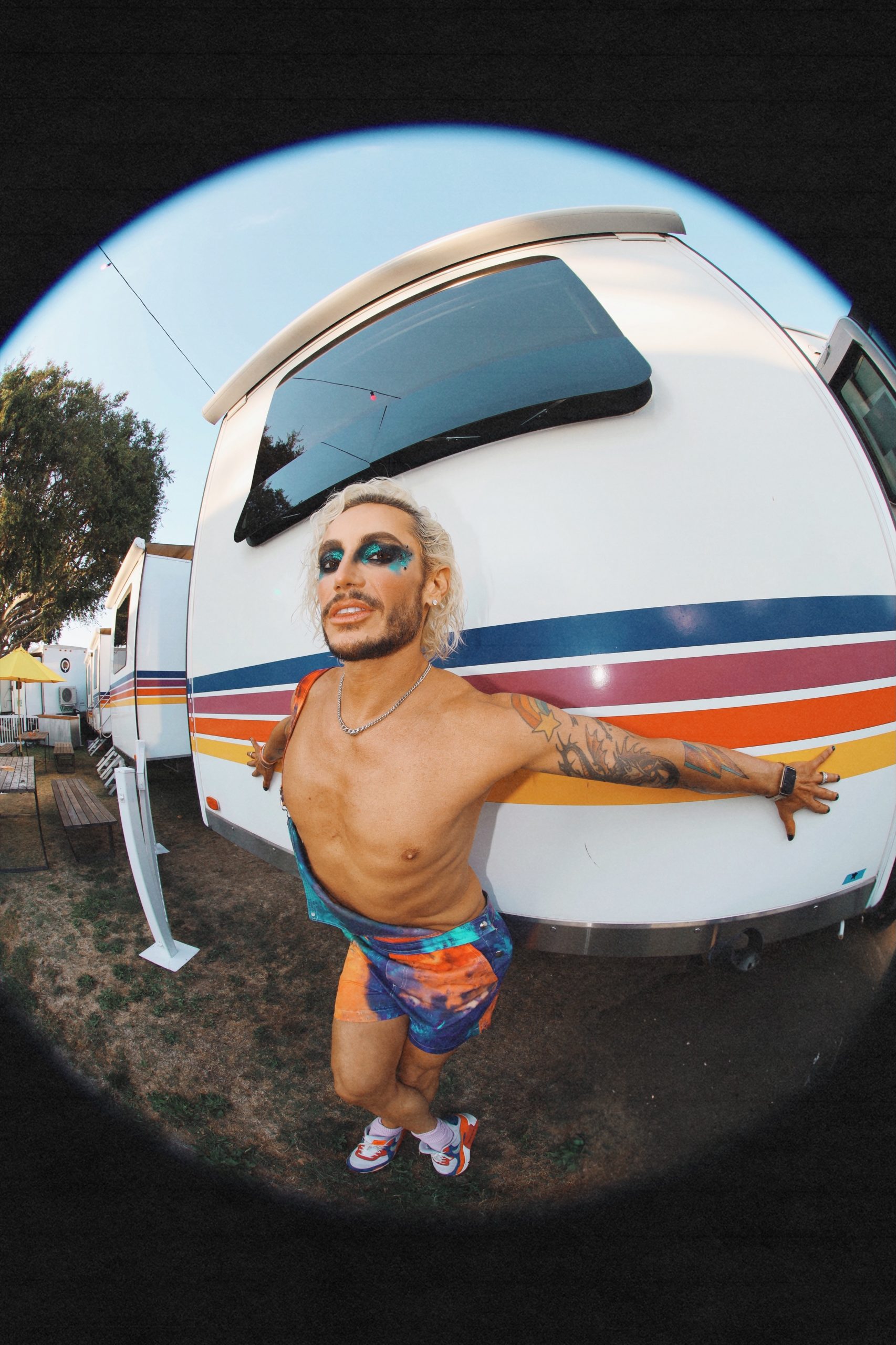
Frankie Grande poses at OUTLOUD festival before performing.
As we hung out by the trailers, Pabllo Vitar emerged in an anime inspired pink butterfly look, with a dozen dancers all dressed in matching pink outfits. She graced me with the opportunity to snap a quick fisheye photo as her team shone the perfect warm lighting for us. Goals.

Luna Lovebad stuns in pink with Labubus to match.
Lastly, the generous king Ryan Mitchell was talking to the one and only Kim Petras and introduced me. Petras was the sweetest and told me I looked cool. I internally screamed, but played it cool and shot some photos of her that may or may not be my current screensaver. After her performance, I floated home on a cloud to prepare for Sunday.

Kim Petras performed new song “Freak It” at OUTLOUD.
I didn’t know how it could get any better, but Sunday proved to be a culmination of the weekend that I never expected. As I mingled by the trailers and sipped my millionth free Red Bull, talent started walking around filming content for the day. I met Corook by the steps, needing to lens their fun personality and style.

Corook was all smiles backstage before their Sunday set.
Then the world shifted and the ground vibrated with only the energy a mother could bring. Before my very eyes, the queen mother herself, Sasha Colby. I introduced myself and congratulated her on her new cannabis venture, being somewhat of an expert myself. We then talked about my journey from budtender to photographer, and I thanked her for her service (and for existing in our timeline.) Never did I think I’d actually burn one with her. Still processing that. Her performance drew A Listers including the likes of supermodel and activist Cara Delevingne.
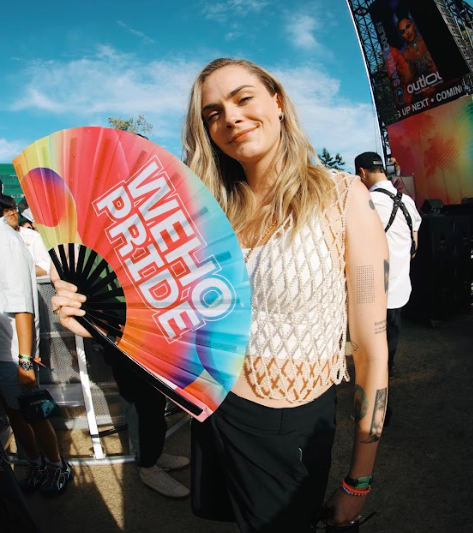
Cara Delevingne at Sasha Colby’s performance.
Then I hung out with Kyra Jete, who I met at the OUTLOUD pride kickoff event a few weeks before. Before her “Club Shy” set, I was lucky enough to capture Shygirl, as I felt a tap on my shoulder. I was asked what I was doing tonight, or if I was free to photograph Remi Wolf. The headliner of WeHo Pride’s OUTLOUD concert.

Remi Wolf headlined OUTLOUD on Sunday, June 1st, ending the night with electrifying glitz and glamour.
Did I just get asked to shoot the headliner of the festival? Well, yes! I met with Wolf for some pre-show portraits and then shot her set, which perfectly wrapped up the weekend with rock and roll that touched the spirit of everyone in attendance.
As I looked through the who’s who of queer musical and drag royalty I had the privilege of capturing during WeHo Pride weekend, it dawned on me that this joy is an act of resistance in itself and I am but an archivist capturing the time I live in.
Yes, Pride started as and always will be a protest and a riot. It is also our art that lives on beyond our time, shining a light for future generations to see how we celebrated our existence in a world that condemns us for it. My hope is that these photos showcase our beauty when we come together as a community filled with talent, love, and beautiful resistance.
Follow Emily Eizen on Instagram for more content.
Arts & Entertainment
Tom Goss talks body-positivity in new bop ‘Bear Soup’
‘Freeing, fun and full of energy’
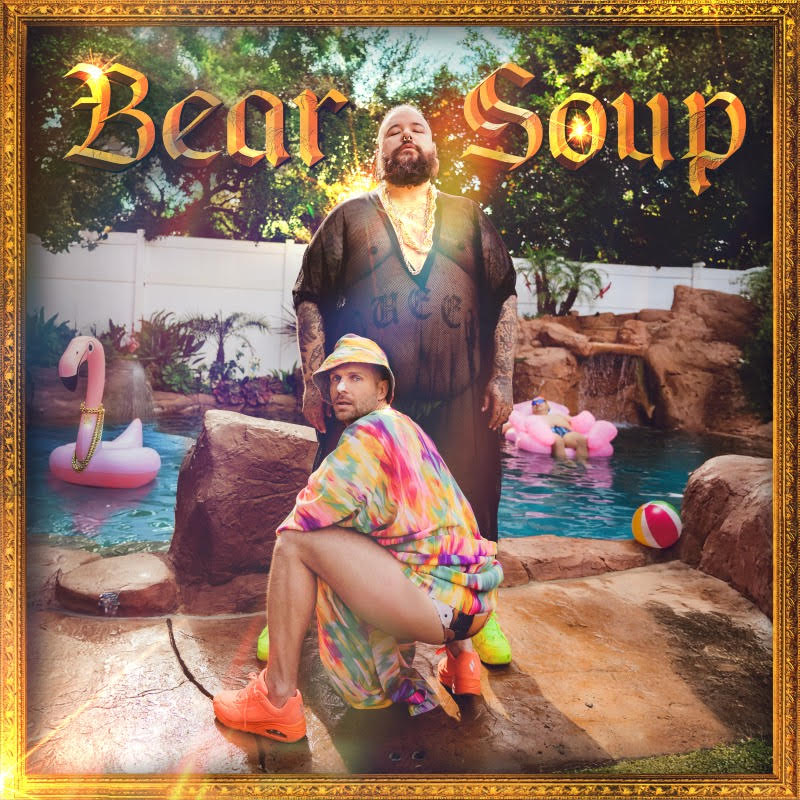
It’s that time of year again, when everyone’s ranting about getting their perfect summer body ready for beaches and pool parties. While working out to feel good is great, let’s be honest – the societal standard for a hot summer body leans heavily toward being thin and having a lack of body hair.
Singer-songwriter Tom Goss counters this narrative through his new single “Bear Soup,” featuring Brooklyn-based rapper Chris Conde. Instead of dropping the usual skinny, twink summer anthem, Goss is serving a body-positive bop that centers bears – the big, hairy, rugged guys who hold a reputation for knowing how to party.
“Bear Soup” marks the fourth and most ambitious entry in his bear song anthology series following the three iconic tracks “Bears,” “Round in All the Right Places” and “Nerdy Bear.”
“Well, simply put, I love bears,” exclaimed Goss. “To me, it feels important to make something bear-centered every couple years.”
It would be unfair to solely attribute Goss’ bear series to his personal love for bears, so he also emphasizes an important message regarding body positivity.
“If these songs, videos, and messages can help someone see themselves in a more positive light, and have a happier life as a result of that, I have done more than I could ever have dreamed of in this world.”
Taking inspiration from bold, confident artists like Cardi B, Megan Thee Stallion, Ice Spice and Flo Milli, Goss set out to create a track that would be right at home on the dance floor. From the very first listen, it is evident that he wanted to make a song that anyone — regardless of body type — could party to. The accompanying music video brings that vision to life, overflowing with fun, freedom and unapologetic self-love.
“As a bear guy myself, I understand the trepidations a chubby gay guy might have if [or] when invited to a pool party. In a culture fraught with rigorous body conscious expectation, the opportunity to create visuals for a song like “Bear Soup” are both freeing and exciting for me,” said Michale Serrato, director of the song’s music video.
The music video is exactly how Serrato describes it: It follows Goss at a lively pool party being completely enamored with the sea of bears around him. From playful swimming scenes to a marmalade wrestling match — with plenty of skin on display — it’s a celebration of body confidence and queer joy.
Conde delivers a powerful, high-intensity verse that balances the song’s playful pop vibe with raw energy. Goss describes Conde as being “unapologetic in who he is” with Conde’s feature elevating the track to the next level.
For Goss, making these videos is more than just fun — it is about creating a space where people can show up as their full selves.
“These videos provide an environment that allows everyone to exude joy, fully and completely loving themselves in the process,” he said.
He even recalls background extras opening up about lifelong insecurities right before filming. But in the affirming, body-positive space Goss fosters, those fears quickly melted away.
“As soon as people arrive and are embraced so warmly, they shine brightly, take off their clothes, and accept themselves freely and effortlessly,” said Goss.
Goss understands the impact his work has had on others, yet he remains humble and never makes it about himself. He’s quick to clarify that he doesn’t take credit for anyone’s coming out or self-discovery, but he acknowledges the meaningful responses he’s received.
“I’ve had countless people tell me they discovered their sexuality or expanded their sense of attraction after watching my videos,” he said. “I’m not taking credit for their sexuality, but I do believe these videos give people permission to see the world and themselves in ways they might not have considered before.”
Although “Bear Soup” has been made and is set to release, Goss has even more in store.
“I have another song and video coming out soon, called “Gay Stuff,” followed by a full album,” he shared. Above all, Goss’s mission is clear: to spread positivity, joy, and encourage everyone to fully embrace who they are. And with a smile, he reminds us to “keep that bear love flowing.”
Music & Concerts
Underdog glorious: a personal remembrance of Jill Sobule
Talented singer, songwriter died in house fire on May 1
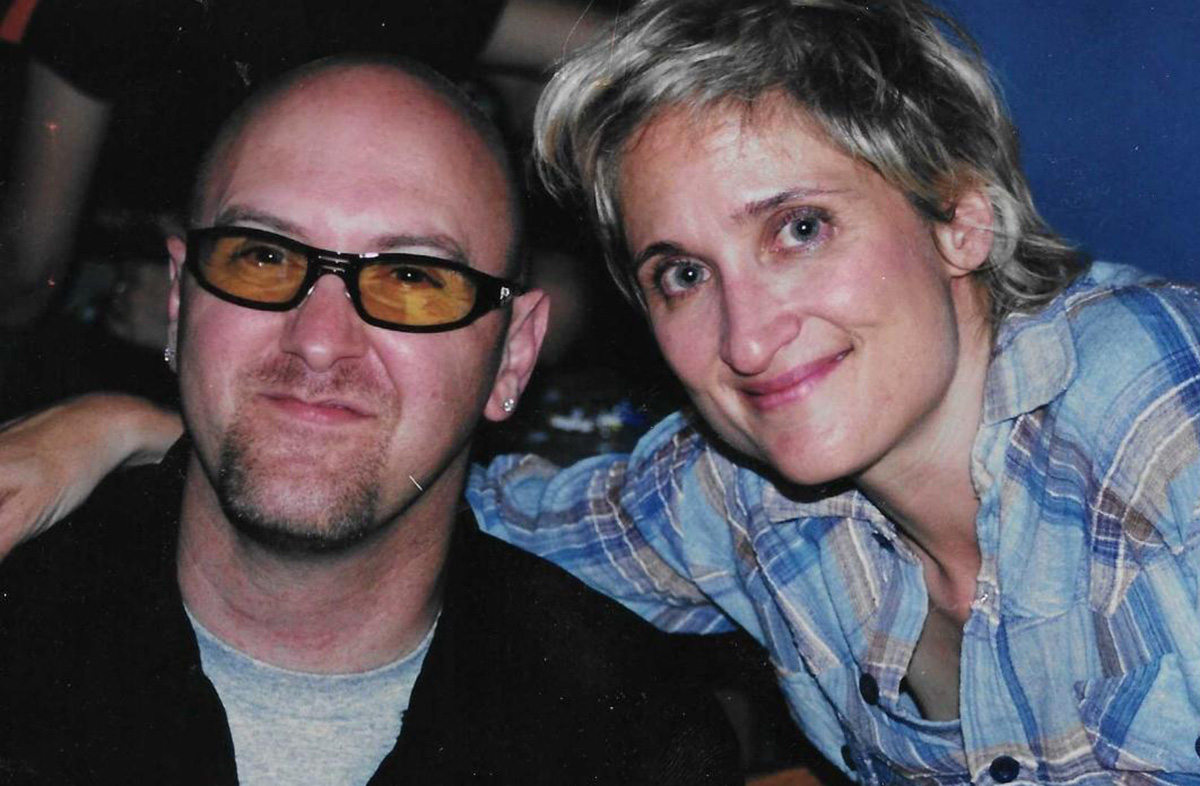
I’ve always prided myself on being the kind of music consumer who purchased music on impulse. When I stumbled across “Things Here Are Different,” Jill Sobule’s 1990 MCA Records debut album on vinyl in a favorite Chicago record store, I bought it without knowing anything about her. This was at a time when we didn’t have our phones in our pockets to search for information about the artist on the internet. The LP stayed in my collection until, as vinyl was falling out of fashion, I replaced it with a CD a few years later.
Early in my career as an entertainment journalist, I received a promo copy of Jill’s eponymous 1995 Atlantic Records album. That year, Atlantic Records was one of the labels at the forefront of signing and heavily promoting queer artists, including Melissa Ferrick and Extra Fancy, and its roster included the self-titled album by Jill. It was a smart move, as the single “I Kissed A Girl” became a hit on radio and its accompanying video (featuring Fabio!) was in heavy rotation on MTV (when they still played videos).
Unfortunately for Jill, she was a victim of record label missteps. When 1997’s wonderful “Happy Town” failed to repeat the success, Atlantic dumped her. That was Atlantic’s loss, because her next album, the superb “Pink Pearl” contained “Heroes” and “Mexican Wrestler,” two of her most beloved songs. Sadly, Beyond Music, the label that released that album ceased to exist after just a few years. To her credit, the savvy Jill had also started independently releasing music (2004’s “The Folk Years”). That was a smart move because her next major-label release, the brilliant “Underdog Victorious” on Artemis Records, met a similar fate when that label folded.
With her 2009 album “California Years,” Jill launched her own indie label, Pinko Records, on which she would release two more outstanding full-length discs, 2014’s “Dottie’s Charms” (on which she collaborated with some of her favorite writers, including David Hadju, Rick Moody, Mary Jo Salter, and Jonathan Lethem), and 2018’s stunning “Nostalgia Kills.” Jill’s cover of the late Warren Zevon’s “Don’t Let Us Get Sick” on “Nostalgia Kills” was particularly poignant as she had toured with him as an opening act.
Jill was a road warrior, constantly on tour, and her live shows were something to behold. My first interview with Jill took place at the Double Door in Chicago in early August of 1995, when she was the opening act for legendary punk band X. She had thrown her back out the previous day and was diagnosed with a herniated disc. To be comfortable, she was lying down on a fabulous-‘50s sofa. “I feel like I’m at my shrink’s,” she said to me, “Do you want me to talk about my mother?”
That sense of humor, which permeated and enriched her music, was one of many reasons to love Jill. I was privileged to interview her for seven of her albums. Everything you would want to know about her was right there in her honest lyrics, in which she balanced her distinctive brand of humor with serious subject matter. Drawing on her life experiences in songs such as “Bitter,” “Underachiever,” “One of These Days,” “Freshman,” “Jetpack,” “Nothing To Prove,” “Forbidden Thoughts of Youth,” “Island of Lost Things,” “Where Do I Begin,” “Almost Great,” and “Big Shoes,” made her songs as personal as they were universal, elicited genuine affection and concern from her devoted fans.
While she was a consummate songwriter, Jill also felt equally comfortable covering songs made famous by others, including “Just A Little Lovin’” (on the 2000 Dusty Springfield tribute album “Forever Dusty”) and “Stoned Soul Picnic” (from the 1997 Laura Nyro tribute album “Time and Love”). Jill also didn’t shy away from political subject matter in her music with “Resistance Song,” “Soldiers of Christ,” “Attic,” “Heroes,” “Under the Disco Ball,” and the incredible “America Back” as prime examples.
Here’s something else worth mentioning about Jill. She was known for collaboration skills. As a songwriter, she maintained a multi-year creative partnership with Robin Eaton (“I Kissed A Girl” and many others), as well as Richard Barone, the gay frontman of the renowned band The Bongos. Jill’s history with Barone includes performing together at a queer Octoberfest event in Chicago in 1996. Writer and comedian Julie Sweeney, of “SNL” and “Work in Progress” fame was another Chicago collaborator with Sobule (Sweeney lives in a Chicago suburb), where they frequently performed their delightful “The Jill and Julia Show.” John Doe, of the aforementioned band X, also collaborated with Jill in the studio (“Tomorrow Is Breaking” from “Nostalgia Kills”), as well as in live performances.
On a very personal note, in 2019, when I was in the process of arranging a reading at the fabulous NYC gay bookstore Bureau of General Services – Queer Division, I reached out to Jill and asked her if she would like to be on the bill with me. We alternated performing; I would read a couple of poems, and Jill would sing a couple of songs. She even set one of my poems to music, on the spot.
Jill had an abundance of talent, and when she turned her attention to musical theater, it paid off in a big way. Her stage musical “F*ck 7th Grade,” a theatrical piece that seemed like the next logical step in her career, had its premiere at Pittsburgh’s City Theatre in the fall of 2020, during the height of the pandemic. The unique staging (an outdoor drive-in stage at which audience members watched from their cars) was truly inspired. “F*ck 7th Grade” went on to become a New York Times Critic’s pick, as well as earning a Drama Desk nomination.
In honor of the 30th anniversary of Jill’s eponymous 1995 album, reissue label Rhino Records is re-releasing it on red vinyl. Jill and I had been emailing each other to arrange a time for an interview. We even had a date on the books for the third week of May.
When she died in a house fire in Minnesota on May 1 at age 66, Jill received mentions on network and cable news shows. She was showered with attention from major news outlets, including obits in the New York Times and Rolling Stone (but not Pitchfork, who couldn’t be bothered to review her music when she was alive). Is it wrong to think that if she’d gotten this much attention when she was alive she could have been as big as Taylor Swift? I don’t think so.
Arts & Entertainment
Craig Ramsay reunites with Catherine Wreford in full-circle moment
Their reunion is about more than friendship, it is about perseverance and the courage to celebrate life to its fullest
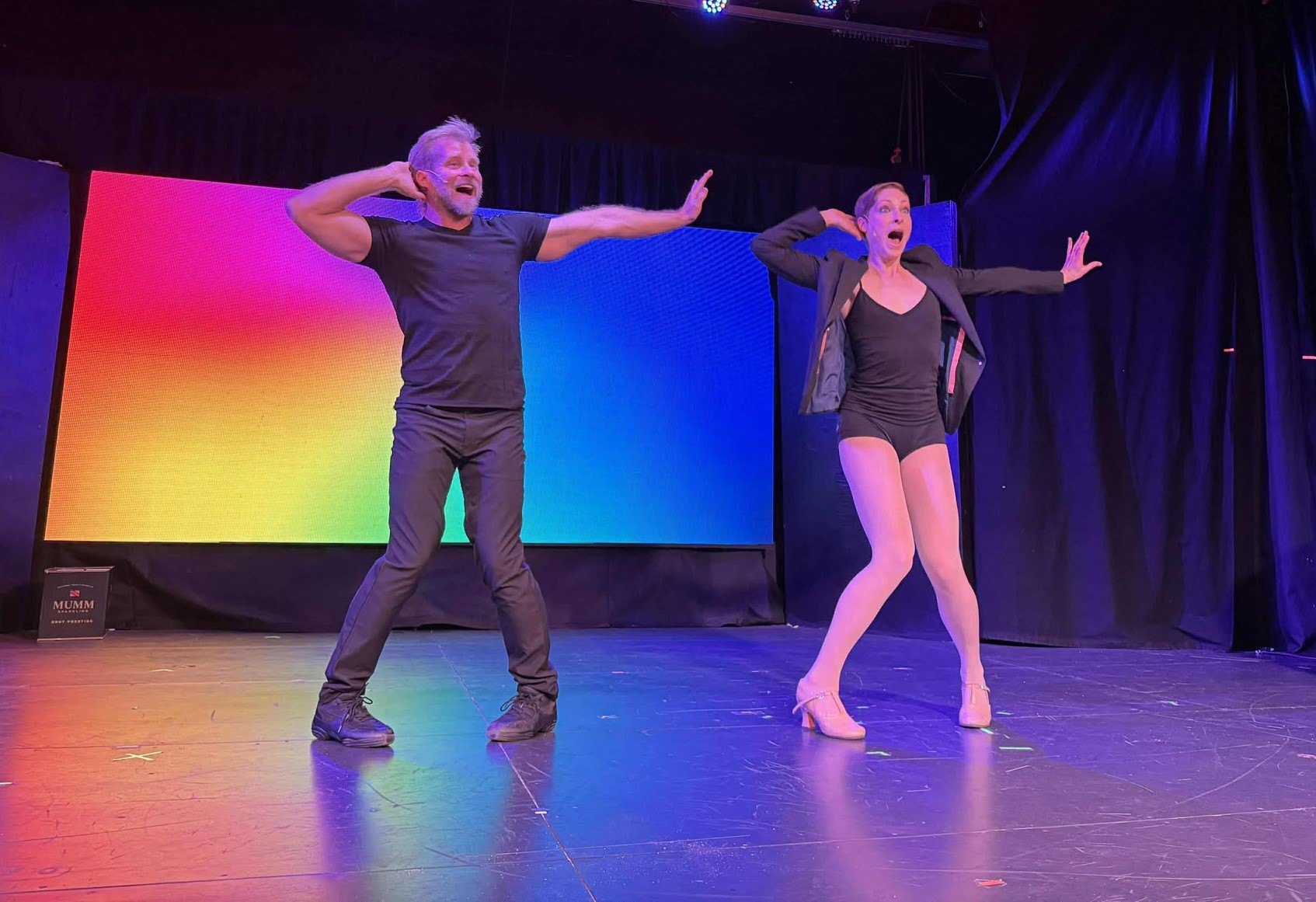
There are people in the entertainment biz, and then there are people in the entertainment biz, such as Craig Ramsay.
He has done just about everything: ballet, Broadway, reality TV, Pride events, fitness forums – he’s been there, done that and he’s far from slowing down any time soon.
A native Canadian, Ramsay earned a full scholarship to the esteemed Royal Winnipeg Ballet’s Professional Division. After his studies, he packed up his dance shoes and headed to Broadway, appearing in an early production of Mamma Mia! as well as Fiddler on the Roof, Chitty Chitty Bang Bang, Cats, Hair, and many others.
He made his national TV debut with his husband, Brandon Liberati, as one of Bravo TV’s earliest featured gay couples on “Newlyweds.” Ramsay would go on to appear on “Thintervention,” “Shahs of Sunset,” and “Real Housewives,” and hosted his own fitness show, “He’s Fit, “on OutTV. Splitting his time between Southern California and Canada, life has come full circle as he is brought back to the world of ballet and a return to reality TV, by way of a beautiful friendship forged in his early days.
When Ramsay met Catherine Wreford while studying at the Royal Winnipeg Ballet in 1996, it became an instant and long-lasting friendship. In addition to their friendship, their careers have now been linked as the two competed – and won – the “Amazing Race” in Canada. They also made a return to the Royal Winnipeg as Lord and Lady Capulet in a production of “Romeo and Juliet,” taking the stage where they met so many years before. Their reunion is about more than friendship, it is about perseverance and the courage to celebrate life to its fullest.
Ramsay and Wreford are bringing their story to the stage with “Behind the Curtain,” an intimate evening of music and storytelling, on Monday, Apr. 21, at Revolutionary Stage Company in Palm Springs.
In 2013, Wreford was diagnosed with terminal brain cancer and given a limited time to live. Now, more than a decade later, she continues to defy the odds and though performing may sometimes offer unique challenges, she continues to take her bow.
We caught up with Ramsay in between performances of his second return to the Royal Winnipeg Ballet for its production of “Jekyll and Hyde” to chat about his career, the power of friendship and his upcoming cabaret.
You have done all kinds of reality TV. What inspired you to do the Amazing Race? It was totally different than what you had done before!
My best friend—and Amazing Race partner—Catherine is a medical miracle. She was given 2 to 5 years to live after being diagnosed with terminal brain cancer … 12 years ago. She thrives on challenges that push her both physically and cognitively, and few things are more intense than The Amazing Race. When I suggested the idea to her, she didn’t hesitate for a second. She said: “We’re doing it—and we’re doing it together.”
It was also the first reality show that appealed to me in a completely different way. Unlike other formats I’ve been part of, “The Amazing Race” doesn’t rely on producers engineering drama or plot lines. You don’t know what’s coming next, and neither does anyone else. It felt like a rare opportunity to do reality TV that’s truly grounded in, well… actual reality. That unpredictability, combined with the chance to take on something extraordinary with Catherine, was the perfect kind of wild.
What did you learn most about yourself from getting through Amazing Race?
What I learned most about myself from “The Amazing Race” was that in moments of chaos, I can find calm, and in that calm, I find clarity. Despite being diagnosed with ADHD and told it would be a lifelong obstacle, I discovered my ability to hyper-focus was actually a superpower on the [The Amazing Race]. It helped me dial in, think fast and power through challenges with my teammate like a laser-focused tornado. Turns out, my brain was built for the pressure!
You have returned to the stage in many ways, ballet and your duo-cabaret! What has it been like for your body and your mental psyche to get back into ballet? Life has come full circle!
Returning to ballet in my late 40s has been a full-circle moment—and a full-body wake-up call. I’ve got way more going on now personally and professionally than I did in my 20s or 30s, and while I’m proud that my body can still meet the demands of roles like Danvers Carew in “Jekyll & Hyde” with the Royal Winnipeg Ballet, I’d be lying if I said it was easy. My brain takes longer to lock in choreography, but I’ve learned that if I lead with the storytelling, the steps follow. It’s a more actor-driven approach to dance—one I wish I used in my youth. As for revisiting my 20s-era dance numbers in our cabaret “Behind the Curtain?” Let’s just say I’m doing them … slightly out of breath and trying not to have a heart attack mid-sequin spin in front of a live audience.
“Behind the Curtain,” what is it like hitting the stage without a role, totally vulnerable and intimate, just you and Catherine telling your own stories with songs?
Hitting the stage without a role to hide behind—just me, Catherine, a mic, and our stories—has been the most vulnerable and freeing experience of my career. When we created “Behind the Curtain,” every moment we debated cutting for being too raw, too shocking, or too hilariously honest… we kept it in. We don’t hold back. Every Broadway chorus veteran has wild stories—we’re just bold (or foolish) enough to share ours. Playing characters is easy. Telling the truth about who we are? That’s the real performance. Most of what we reveal on stage has only ever been shared between the two of us. In this show, you get to know us more intimately than any reality show ever could. It’s terrifying but thrilling at the same time.
What makes this performance different than anything you have done before?
Even though Catherine and I have played major roles on Broadway, this show feels like the biggest undertaking of our careers. It’s just the two of us, holding the stage for two full hours—no cast, no set pieces, no costumes to hide behind. Just our voices and our stories. Honestly, it feels like we’re at our own celebration of life… except we’re not dead—we’re just killing the audience with our stories.
Why is it so important for you and Catherine to continue telling your stories with “Behind the Curtain?”
We actually talk about this in the show—because the truth is, with the uncertainty around how much time Catherine has left, “Behind the Curtain” is our way of getting it all out there. It’s the legacy she deserves. It’s raw, it’s pretty, it’s messy… it’s us. And that’s what makes life beautiful. We want this show to inspire people to live fully, love fiercely, and honor the friendships and chosen family that carry us through it all.
Catherine is such an inspiration in so many ways. How did your friendship evolve, and what can we all learn from her?
What people might not know is that our friendship started with me playing the role of the responsible older brother, trying to rein in Catherine’s fearless, defiant teenage fire. We entered the industry young and had to be everything for each other—mentors, lifelines, protectors. Our bond has evolved through so many chapters, that it feels like it’s had seven lives. Honestly, we don’t think we’d be alive without one another. And as wild as it sounds, we both believe our higher selves are holding hands, plotting these incredible, often chaotic moments that turn into stories we’re meant to share with the world. We’re connected in this life… and beyond.
With so many different entertainment projects you’ve done, what direction do you head to next?
It wasn’t something we originally set out to do, but after the overwhelming feedback from “Behind the Curtain,” we feel the next step is Off-Broadway. That’s where the show is headed. At the same time, we’ve taken the inspiring stories we’ve lived—centered on friendship, kindness, and compassion—and created something new: the first-ever keynote presentation told through story, song, and dance. It’s called “Survival of the Friendliest,” and we’re partnering with the Speakers Bureau of Canada to bring it to audiences across the country.
What is your message to your fans?
Our show “Behind the Curtain,” is resonating with people in such different and personal ways, that it wouldn’t feel right to narrow it down to one message. At this point in our lives, careers, and friendship, the best thing we can do is share our stories honestly and let them land however people need them to. If we’re bringing “Behind the Curtain” to your city—or somewhere nearby—we’d love for you to come experience it. And if you’re part of an organization or business that hosts keynote events, reach out! We’d be honored to inspire, entertain, and connect with you.
Tickets can be purchased here.
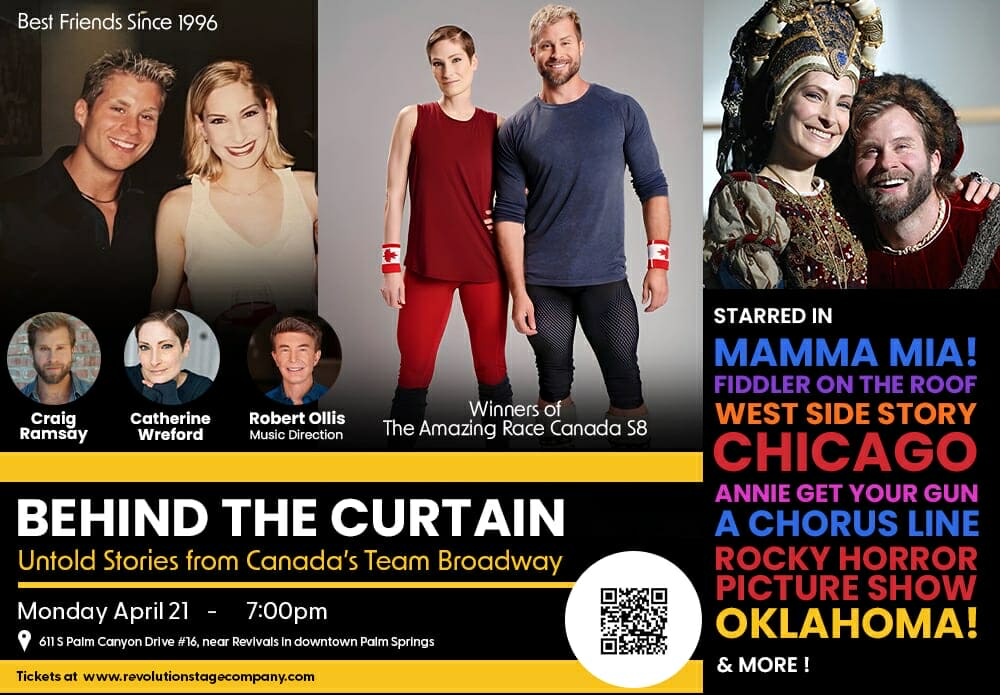
Music & Concerts
J. Lo, Troye Sivan, RuPaul added to WorldPride Music Festival
Two-day event to feature array of musical genres

WorldPride organizers on Tuesday announced two new headliners for the WorldPride Music Festival at RFK Festival Grounds (2400 East Capitol St., N.E.) June 6-7 in Washington, D.C.
Superstar Jennifer Lopez and gay pop artist Troye Sivan are set to headline, while drag trailblazer and TV star RuPaul will also take the stage for a DJ set.
Taking place over two days and nights and across three stages, WorldPride Music Festival will showcase a diverse range of music. Beyond pop stars and drag performances, house, EDM, techno, country, R&B, and a host of other genres will be heard across the weekend.
Featured LGBTQ audience fan favorites include Kim Petras, Rita Ora, Betty Who, and Marina. House and electronic fans will enjoy Zedd, Grimes, Purple Disco Machine, and Sofi Tukker. Other top-billing pop stars include Tinashe, Raye, and Grimes; Paris Hilton is also set to make an appearance.
Other artists that will bring their sounds to one of the stages include Aluna, Anabel Englund, Anne Louise, Coco & Breezy, Crush Club, Dombresky presents Disco Dom, Galantis, Hayla, Kaleena Zanders, Karsten Sollors, Leland + Friends, LP Giobbi, Matt Suave, Patrick Mason, Sasha Colby, Slayyyter, Spencer Brown, Trisha Paytas, and Ty Sunderland.
The music festival came together as a partnership between Capital Pride, Dreamland’s producer Jake Resnicow (who ran WorldPride in New York), and event promoter Club Glow, which has produced several music festivals in the region. Club Glow is set to host a separate festival, Project Glow, also to take place on RFK grounds the weekend prior to WorldPride.
Resnicow, as executive producer, noted that, “WorldPride Music Festival is a moment the world will remember. With legendary artists and our global community coming together, we’re creating an electrifying celebration that unites, uplifts, and amplifies LGBTQ+ voices like never before.”
Given the current political climate and anti-LGBTQ policies sweeping the country, “Hosting this festival in our nation’s capital makes it even more powerful — it’s not just a party, it’s a global movement.” Resnicow added.
Beyond the music, the festival will feature art installations and immersive experiences that celebrate the spectrum of LGBTQ culture, along with food and drink, specialty cocktail lounges, giveaways, and a VIP section. Proceeds from the event will benefit the nonprofit Capital Pride Alliance and other local LGBTQ community organizations, ensuring the festival’s impact extends beyond its two days of programming. WorldPride marks the 50th anniversary of Pride in the capital.
General admission, GA+, and VIP tickets start at $209.
Music & Concerts
Lana Del Rey, Katy Perry plan fall releases
A Fleetwood Mac live album, more Joni archives among vintage options

Paris Hilton released her “Infinite Icon” album on Sept. 6. It’s just the second effort following a massive hiatus — her debut album “Paris” was released way back in 2006. Sia produces. This summer’s “I’m Free” was the first single. A tour is planned. Hilton promised a “heavily gay-leaning release.”
Miranda Lambert’s “Postcards from Texas” is slated to drop today. Lambert’s 10th studio album was preceded by the May release of single “Wranglers,” which stalled in the lower 30s on country radio. Lambert calls the album a musical ode to her home state. She co-produces with Jon Randall and either wrote or co-wrote 10 of the project’s 14 cuts.
Katy Perry’s “143” is set for a Sept. 20 release. It will be her seventh studio album. Its title refers to what she says is her symbolic angel number. Perry is aiming for a dance party feel working with producers Max Martin, Dr. Luke, Stargate, Vaughn Oliver and Rocco Did It Again! The proceedings are not off to a strong start. First single “Woman’s World” stalled at No. 63 on the Billboard Hot 100. Follow-up “Lifetimes” failed to crack the Hot 100 at all.
Fleetwood Mac releases “Mirage Tour ’82” on Sept. 20. It includes six tracks previously unreleased including “Don’t Stop,” “Dreams,” “Never Going Back Again,” “Sara” and more. Available on double CD, triple vinyl and digitally.
Volume four of Joni Mitchell’s “Archives” series dubbed “The Asylum Years: 1976-1980” releases Oct. 4. It’s being offered in six-CD or four-LP (highlights) configurations. It will feature unreleased studio sessions, alternate versions, live recordings, rarities and a 36-page book with new photos and an extensive conversation between Mitchell and filmmaker/uberfan Cameron Crowe.
Sophie B. Hawkins releases her “Whaler Re-Emerging” album (a re-recording of her landmark 1994 album) on Oct. 15. Order through her site and the first 250 copies will be signed. Hawkins (who identifies as omnisexual) says it surpasses the original.
Joe Jonas’s “Music for People Who Believe in Love” and Shawn Mendes’s “Shawn” are both set for Oct. 18 releases. Jonas’s album (his first solo effort since 2011’s “Fastlife”) will feature songwriting he says is of a more personal nature. Billboard called it “unvarnished” but with a shimmery pop sound aglow with garage rock and alt-pop influences. First single “Work It Out” was released over the summer and failed to chart.
“Shawn” will be Mendes’s first album since 2020’s “Wonder,” the tour of which he cancelled citing mental health. Two singles — “Why Why Why” and “Isn’t That Enough” — have been released. The former stalled at no. 84 on the Hot 100. He has called the album his “most musically intimate and lyrically honest work to date.”
Lana Del Rey’s “Lasso” is expected for a possible fall release, although some sources say it’s been bumped to early 2025. No date had been announced as of yet. She’s apparently going the Beyonce route and releasing a straight-up country album.
Dolly Parton plans a Nov. 15 release for “Smoky Mountain DNA — Family, Faith & Fables.” Parton recruited family to help her on the 37 (!)-track collection, which will also encompass a four-part docuseries tracing Parton’s familial roots. One song (“A Rose Won’t Fix It”) is an outtake from the feverish writing sessions that led to her solid (but underrated) 1998 album “Hungry Again.” An extremely limited-edition triple vinyl release is also planned.
Release dates shift and many more releases will be announced later. Pitchfork keeps a great running tab at pitchfork.com/news/new-album-releases. Also check your local record store for Black Friday special editions available on Friday, Nov. 29. Release info was scant as of this writing.
(Joey DiGuglielmo was variously the Washington Blade’s news and features editor from 2006-2020.)
Music & Concerts
Kylie Minogue makes hearts go PADAM at WeHo Pride OUTLOUD
Pop singing sensation Kylie Minogue delivered a string of her biggest hits at the WeHo Pride OUTLOUD Music Festival on Sunday

By Paulo Murillo | WEST HOLLYWOOD – Pop singing sensation Kylie Minogue delivered a string of her biggest hits at the WeHo Pride OUTLOUD Music Festival on Sunday, June 2, 2024. The highly anticipated concert included songs like “Come Into My World,” “Spinning Around,” “All the Lovers,” “Can’t Get You Out of My Head” and “Padam-Padam” to name a few.



The Australian pop goddess also debuted a new song, a duet with fringed-mask-wearing country singer Orville Peck, called “Midnight Ride,” produced by Diplo, who also joined the duet on stage.
The performance, part of the LGBTQ+ concert event, captivated the audience and has since garnered attention online, with a clip of their duet circulating widely. “Midnight Ride” is now available for pre-order on all music download platforms.
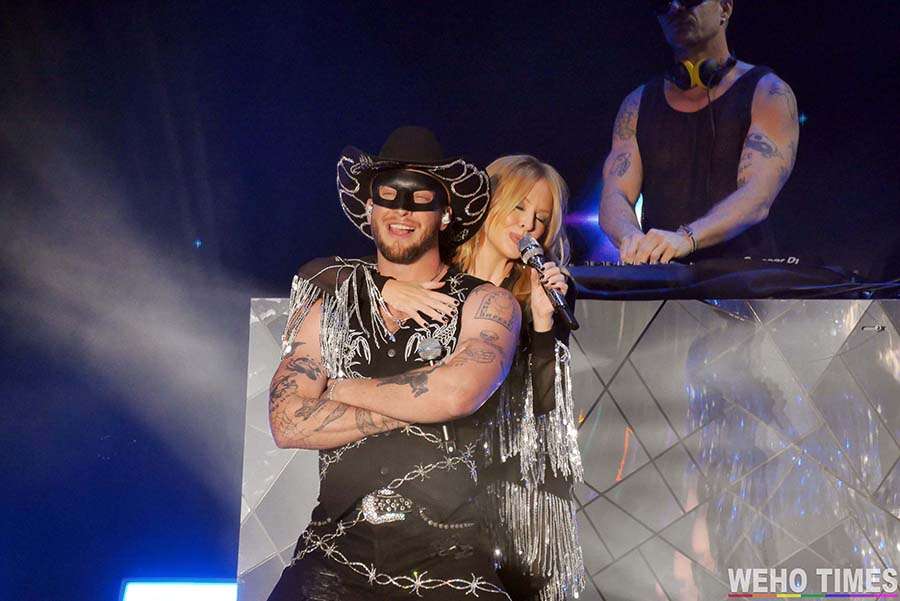
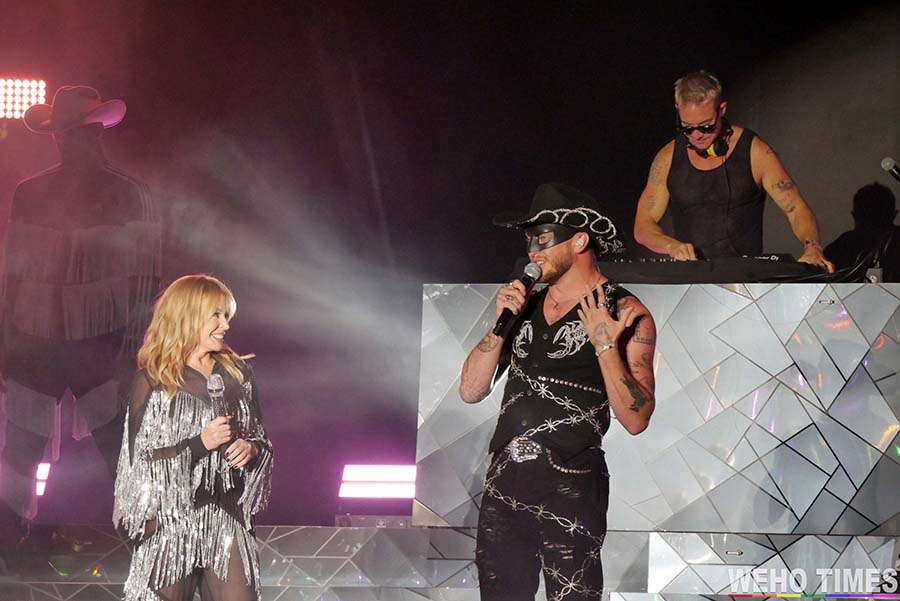
According to reports Minogue is teaming up again with Lostboy, the producer behind her hit “Padam Padam.” Lostboy, whose real name is Peter Rycroft, hinted at their new material, suggesting it could be part of a follow-up to Minogue’s 2023 album, “Tension.”
“Padam was its own thing, it’s lived its own life. The new stuff is so fun as well in its own way. I don’t know when it will be out,” Rycroft told The Sun newspaper’s Bizarre column.
Orville Peck and Diplo are no strangers to the WeHo Pride OUTLOUD Music Festival in West Hollywood. Diplo did a DJ set on Sunday night right before Kylie hit the stage for her own performance, and Orville was a main headliner at last year’s WeHo Pride music event.
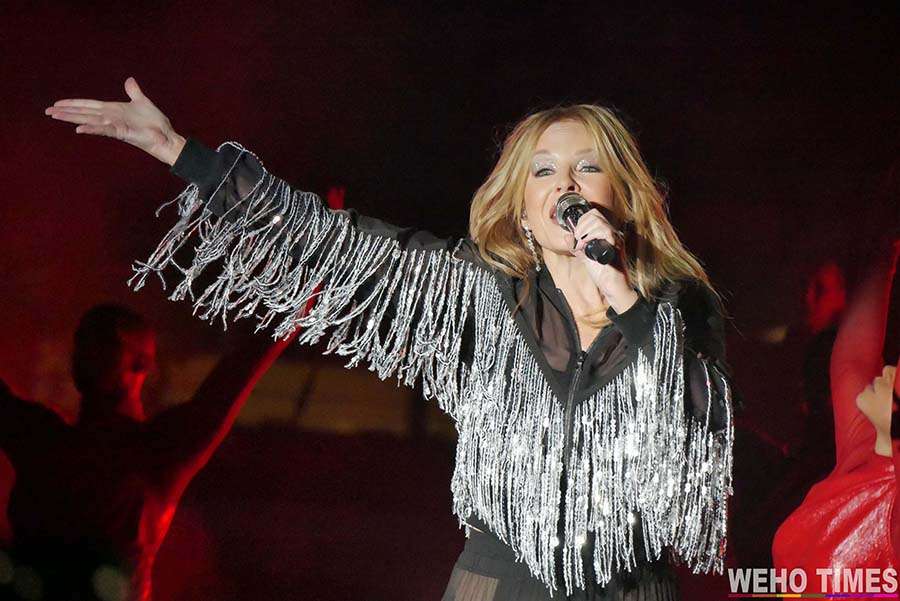
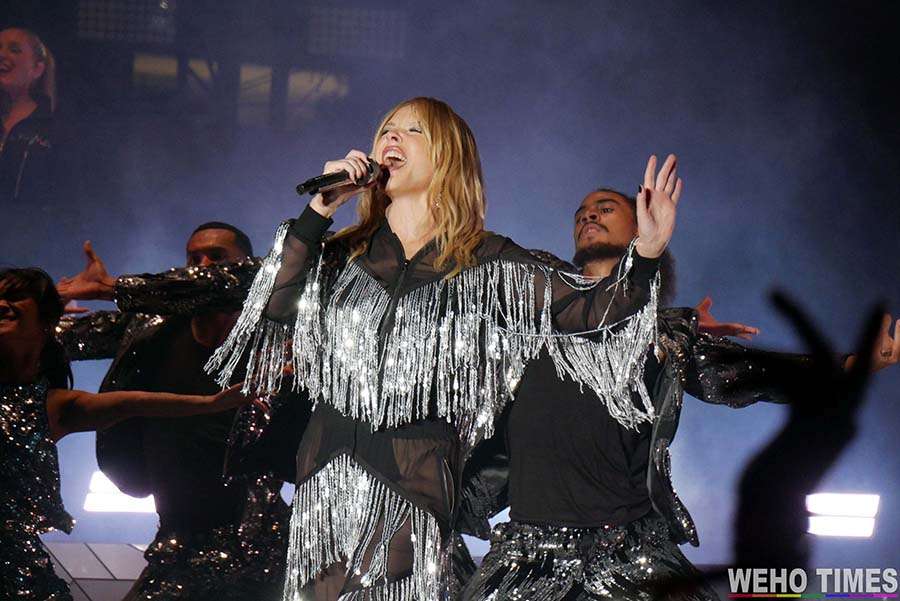
The crowd was massive and could be heard singing along to all the classic tunes. Kylie had two outfit changes. The set was tight, and there was no encore performance. Sources report that she had a plane to catch right after the show.
During Kylie’s set, West Hollywood Mayor John Erickson, Vice Mayor Chelsea Byers, and Council Member Sepi Shyne joined the singer on stage to inform her and the crowd that the City of West Hollywood has declared June 2nd as Kylie Minogue Day. They also presented her with a Kylie Minogue Way street sign to commemorate the day. She showed off her sign to the crowd and thanked the council for the welcome.
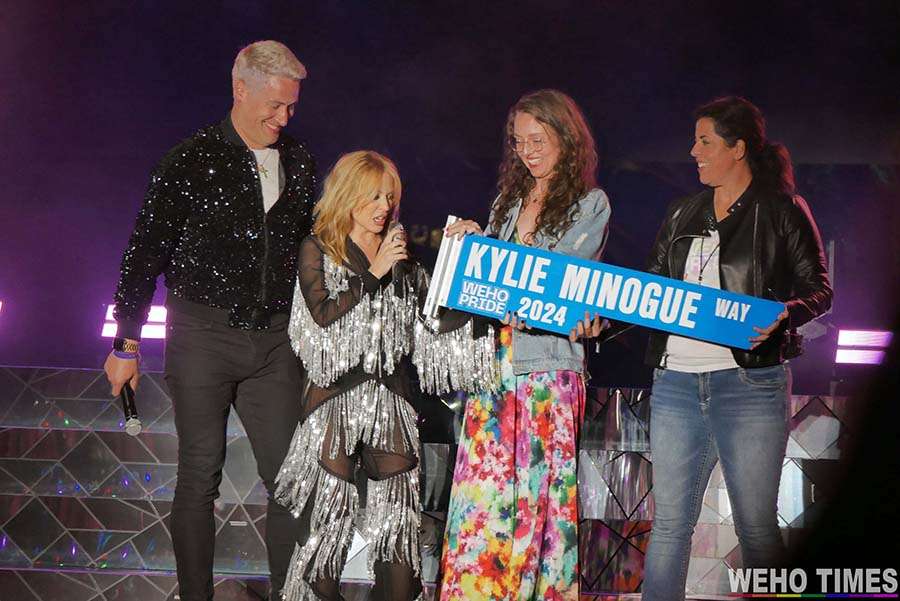
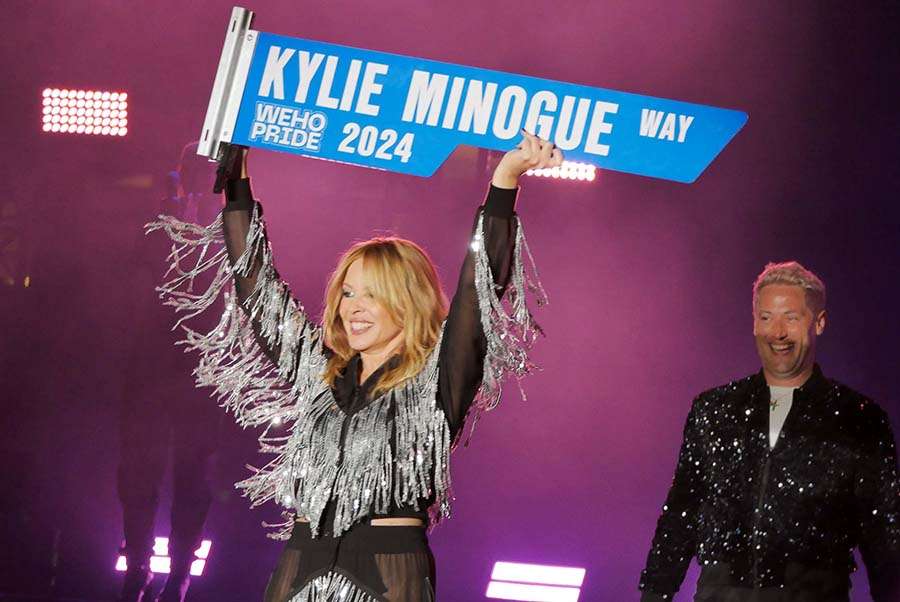
Kylie’s performance was the wrap-up for WeHo Pride 2024.
******************************************************************************************

Paulo Murillo is Editor in Chief and Publisher of WEHO TIMES. He brings over 20 years of experience as a columnist, reporter, and photo journalist. Murillo began his professional writing career as the author of “Love Ya, Mean It,” an irreverent and sometimes controversial West Hollywood lifestyle column for FAB! newspaper. His work has appea
******************************************************************************************
The preceding article was previously published by WeHo Times and is republished with permission.
Music & Concerts
The Voice crowns its very first LGBTQ winner with Asher HaVon
After 25 seasons, The Voice has crowned Asher HaVon. Asher is more than a voice, he is the spiritual representation of equality itself
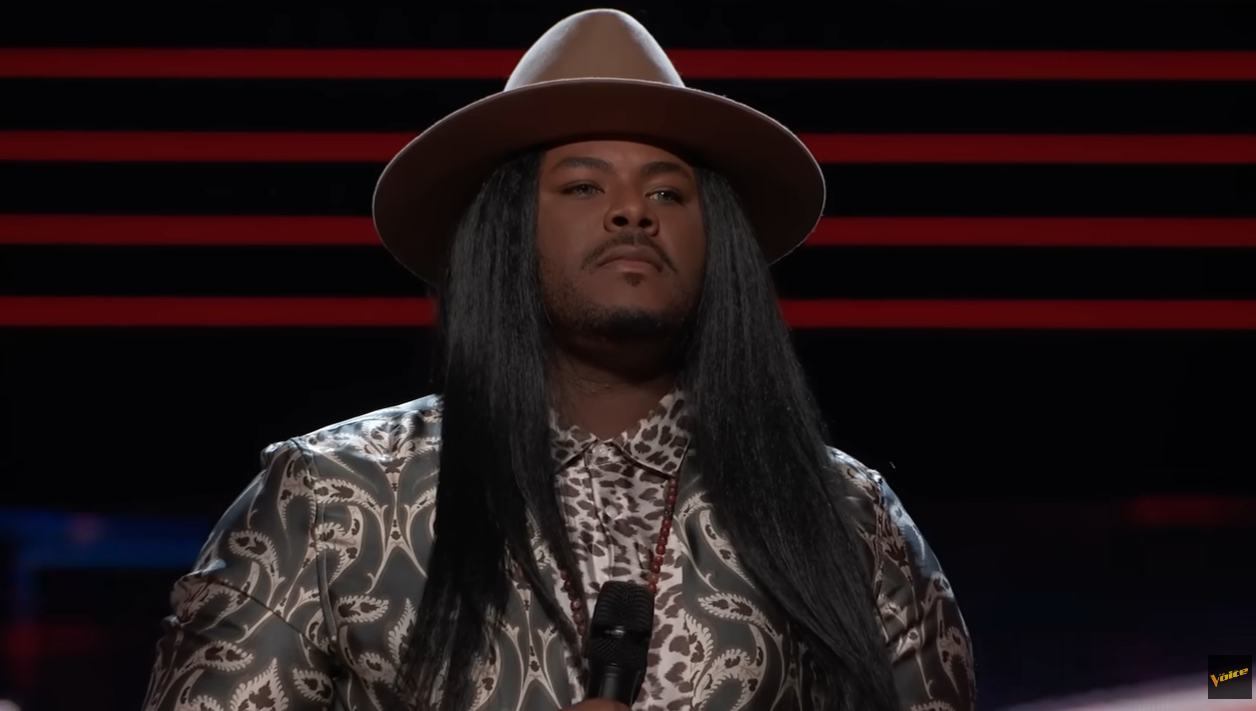
HOLLYWOOD – So, the LGBTQ pundits and culture watchers were… wrong. Or at the very least, anticipating “history” way before its time. After frustration over American Idol’s inability to crown an LGBTQ winner, they held high hopes for a new competing star-making vehicle, The Voice.
In 2011, The Advocate burst with excitement saying “There’s no need to wait on NBC’s new vocal competition, The Voice. The show boasts four gay contestants — two men and two women — heading into the battle round, where they will be coached by the likes of Blake Shelton, Cee Lo, Christina Aguilera, and Adam Levine. And while a couple of them might be eliminated in the next few weeks (in the battle round, teams of eight are whittled down to four when teammates face each other in a sing-off), chances that there will be a lesbian or gay singer competing to become the first “Voice” are strong.”
Well. Not so strong. All of the LGBTQ contenders were eliminated. As were others over the years that even included a young transman singing with his father as one of the show’s few duet contestants. American Idol did end up crowning an LGBTQ winner in its 18th season.
That was then… and this is now. After 25 seasons, The Voice has crowned Asher HaVon its winner. It is no wonder, as Asher’s vocal tone is hypnotic, rich, and blows through your auditory senses. Listening to him hit certain notes in his vocal runs can bring you to a flood of emotional tears. At least, it did for me.
It did for coach Reba McIntire as well.
The significance of Asher HaVon’s win goes beyond just a queer identity. It is adorned with a depth of representation and visibility. When Asher stepped on stage, he brought culture, diversity, history, and identity.
Like many incredible vocalists, he comes from a church foundation. Reba McEntire was a wise coach choice, relating to a broad reach of American sensibilities. She is one of the rare entertainers who is beloved by fans across the broad political spectrum. She is traditional, but an ally.
In a bit of irony, there is a segment of his hometown that still are keeping his LGBTQ status in the closet. The Selma Times Journal brags about his “historic win”, but when they write about it, they are referring to the fact that he is the first winner from Alabama. They do not mention his LGBTQ identity at all.
Not sure how they could miss it. Asher presents in full-beat makeup with gorgeous nails to diva quality eye makeup and lashes. His costuming was never anything less than fabulous. His song choices placed him in a pantheon of LGBTQ-worshipped goddesses that included Adele, Beyonce, Whiney Houston, Patti LaBelle, Toni Braxton, Tina Turner, and Donna Summer. He was not only courageous to take on their groundbreaking hits, but did so with the talent to impress with his own versions of them.
As Asher stands on stage, he also represents a proud black man living in the spirit of America’s civil rights movement. He truly does represent Selma Alabama, and its fight for equality significance is part of his DNA and his history. In 2015, when President Barack Obama visited the city, Asher sang for him in front of a crowd of 200,000 at the famed Selma Bridge crossing.
While the significance of that event is not lost on him, Asher calls it one that he “will never forget”, he tells the Montgomery Advertiser that The Voice “is different because it is the Asher HaVon that most people never got a chance to see. I am free. I am walking in the authenticity of who I am, while sharing my gift. That means so much more to me than any other experience than I’ve ever had in life.”
While Asher carried his legacy, the history he represented, and his authenticity into every performance he gave over the show’s run, it was his pure talent that put him on top. It was so impressive that it even broke through the show’s premise of four celebrity coaches battling it out for a win. Under that guise, each of the coaches pleads with America to vote for their protégés.
Asher had most of them pleading for him instead. He initially received three “chair turns” at the outset where Chance the Rapper, Dan & Shay, and Reba were the celebrities campaigning for him to pick them. John Legend was the hold-out. Asher, ever the diva connoisseur, had already picked Reba in his mind and would have picked her no matter what anyone else had said.
Legend, later in the season, shared that he received a phone call from his dad who declared not only that he was rooting for Asher, but that Asher was “THE” voice of the season. Both Legend and Chance declared Asher to be “the best vocalist on the show” several times in their feedback statements.
While Asher’s win and authenticity should bring a source of joy to LGBTQ fans, it also is a big boost for his coach and main champion, Reba McEntire. While the show has put a full-throttle on Reba as the “queen of country” and showered her with adoration, she has had some difficulty in wowing many of the auditioning singers onto her team. Asher represents a significant win for her, as well as her being also the coach for first runner-up Josh Sanders, when she starts the next season against Gwen Stefani, Michael Bubble, and Snoop Dogg. The latter two are newcomers and Stefani boasts only one previous win years ago, but a loss in her one previous match-up against McEntire.
For the future Voice contestants, Reba has some serious creds to play.
For the rest of us, in the LGBTQ community, in the dance clubs, and in the hearts of ones needing a new diva to love, Asher has arrived.
Related:
Asher HaVon and Coach Reba perform Patti LaBelle and Michael McDonald’s “On My Own” during The Voice finale.
******************************************************************************************
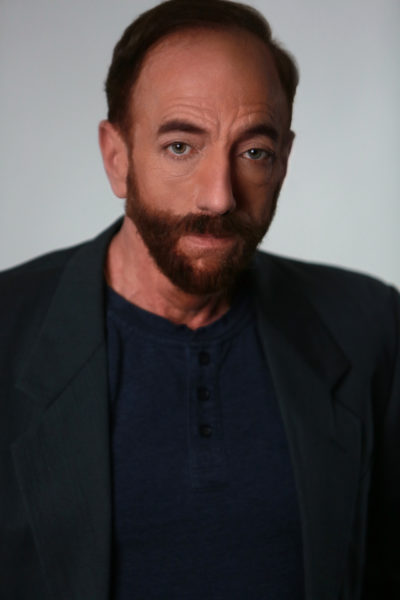
Rob Watson is the host of the popular Hollywood-based radio/podcast show RATED LGBT RADIO.
He is an established LGBTQ columnist and blogger having written for many top online publications including The Los Angeles Blade, The Washington Blade, Parents Magazine, the Huffington Post, LGBTQ Nation, Gay Star News, the New Civil Rights Movement, and more.
He served as Executive Editor for The Good Man Project, has appeared on MSNBC and been quoted in Business Week and Forbes Magazine.
He is CEO of Watson Writes, a marketing communications agency, and can be reached at [email protected]
Music & Concerts
Here is the Earth Day anthem we forgot we needed
Singer/songwriter Anne Stotts releases Water to Blood as our collective call to action as we mark Earth Day
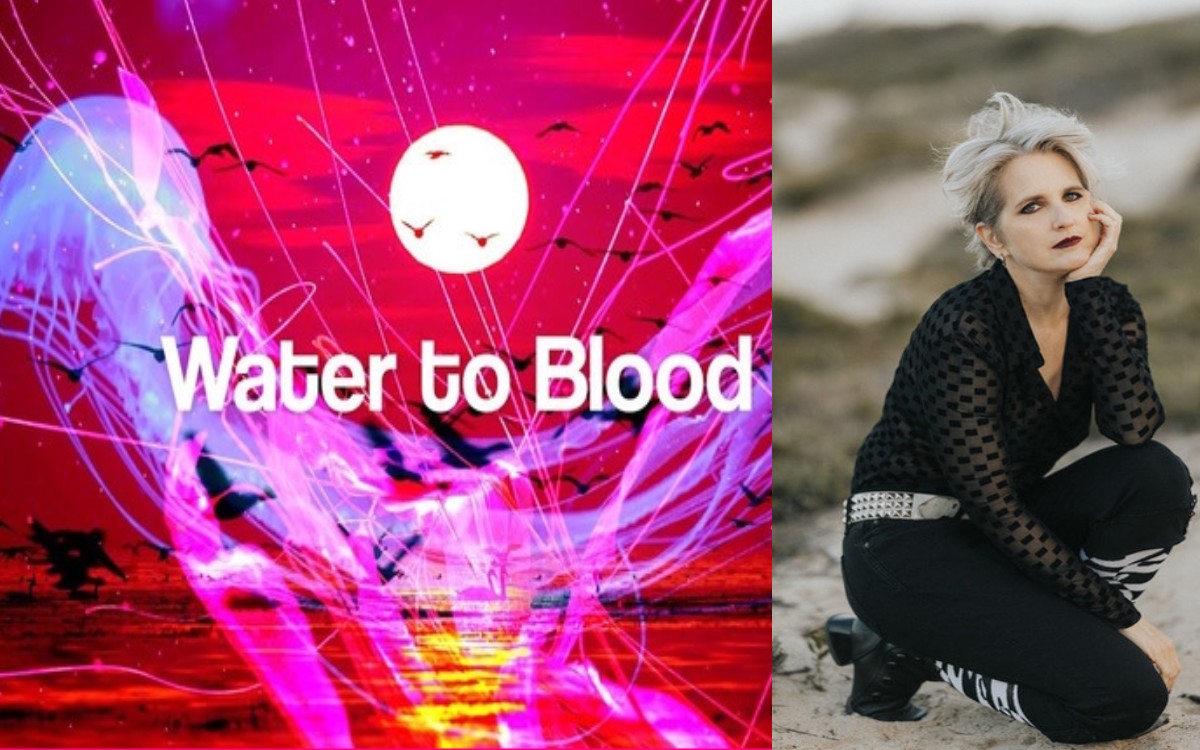
HOLLYWOOD – The evolution of Earth Day, from its inception in 1970 to the global movement it is today, has been accelerated by dire and extreme climate change events that do not seem to have garnered the political attention they deserve. Cataclysmic events have underscored the reality of global warming in the face of industries and populists who want to deny it.
Earth Day 2024 is a day that united millions in the past and continues to inspire action towards environmental sustainability and conservation today.
As glaciers melt and weather systems buckle, we need a call-to-action anthem. Just as We Are the World unified hearts and minds against famine and starvation, we need to blast the climate change cause to reach souls where other agendas may be keeping their minds in the dark. Music transcends barriers, connecting with people on an emotional level and inspiring change in ways that statistics and reports cannot.
Anne Stott’s Water to Blood is the anthem we need this Earth Day. It strives to inspire us all, and the powers that be, to address the climate crisis NOW.
You can squeeze the earth til it’s dry and the people til they’re weak, build a wall so high you can’t hear the screams, but so far we’ve had fires, floods and now the plague. This empire’s dying cause it can’t face change. The time’s here now, it’s not coming… it’s come. Water to Blood
Incisive. Vibrant. Dramatic. Anne Stott is a singer/songwriter of cinematic alt-rock, an actor, and an apolitical rabble-rouser. Her “bad girl to the good girls and good girl to the bad girls” energy infuses her music and live performances with edgy compassion while her elastic style embraces eighties pop and nineties grunge infused with a modern moody atmosphere.
Produced by Blondie/Rufus Wainwright producer Barb Morrison, the Water to Blood anthem smashes the psyche to its core, leaving the listener energized, motivated, and with a sense of urgency that too much time has passed to ignore our collective environmental crisis any longer.
“The Right Wing is so GOOD at spinning,” Anne Stott tells me when we sat down for the Rated LGBT Radio podcast. “My hope for this song is that it will motivate people who haven’t been engaged in climate change to get more active and it will be a comfort and it will help rejuvenate and energize those who have been devoting their lives to make change. I think the production of the song combined with the lyrics creates a nice synergy of political takedown and an optimistic, motivational vibe. And I definitely have both of those sides. I am always deeply moved by people standing up for what is right and if this song can contribute to people’s struggle to protect our future on this planet that would make me really happy”
As a quirky queer singer-songwriter and film actress that splits her time between Cape Cod and New York City, Anne wields a unique worldview as someone who was formed by growing up internationally.
Born in Philadelphia, she grew up in Luxembourg and moved to the UK, then Minnesota and New York City. She moved to Provincetown in 2007 for a writing retreat for a few months and ended up staying. She busked in the street outside of the town hall and got discovered by director David Drake, who cast her in a play at the local art house.
She was involved in political activism (she was a member of the Lesbian Avengers) but “hit a wall” because she wanted to do something more creative. She has released two albums of original music, Love Never Dies and Pennsylvania.
Who does she see as the biggest villains against a climate change solution? Big Plastics, and Big Oil. “The plastics industry and the oil industry are going to hold on to their propaganda until they can milk every penny they can from the planet,” she says.
Being in New York City when wildfires in the east clouded the sky, Anne was impacted. “It was like something out of a horror movie,” she recalls. “We HAVE to stop calling these things anomalies. The anomalies are no longer ‘anomalies’. I have to stop myself from calling these ‘distinct events’, no, this is the normal now and it is really scary, and it is really hard to own that.”
Is there hope? “I am very inspired by the youth movements around climate change. They are not as big in the news right now, but there is a lot of engagement with people in their 20s and their teens, and that is very inspiring.”
“I think of the government coming together for the Manhattan Project and the development of the atomic bomb. We need that level of commitment, drive, and expertise to come together to look at this from all angles. People want to do more, but we have shaped this culture around convenience, and it is hard to walk that back individually,” she adds.
When she is not saving the world, Anne and her music is a bewitching synergy between Joni Mitchell and Chrissie Hynde, performing sincere and engaging personal songs as well as those about social change and political takedown.
The Water to Blood climate change track launches today to coincide with Earth Day. It will be also on her upcoming album Watershed Synapse Experience which comes out in September. (Also produced by Barb Morrison).
In the meantime, she will be releasing more singles from thought-provokers on racism, to a hot dance track. While you wait, download Water to Blood, turn up the volume and wake up everyone in listening distance.
Literally and figuratively – because the crisis isn’t coming, it’s come.
Watch:
*********************************************************************************

Rob Watson is the host of the popular Hollywood-based radio/podcast show RATED LGBT RADIO.
He is an established LGBTQ columnist and blogger having written for many top online publications including The Los Angeles Blade, The Washington Blade, Parents Magazine, the Huffington Post, LGBTQ Nation, Gay Star News, the New Civil Rights Movement, and more.
He served as Executive Editor for The Good Man Project, has appeared on MSNBC and been quoted in Business Week and Forbes Magazine.
He is CEO of Watson Writes, a marketing communications agency, and can be reached at [email protected]
Related:
Music & Concerts
Raw & resolute, Damez brings the intersectional image we need
He showcases his talents & versatility through an eclectic catalog of self-penned songs, choreography-heavy visuals & performances
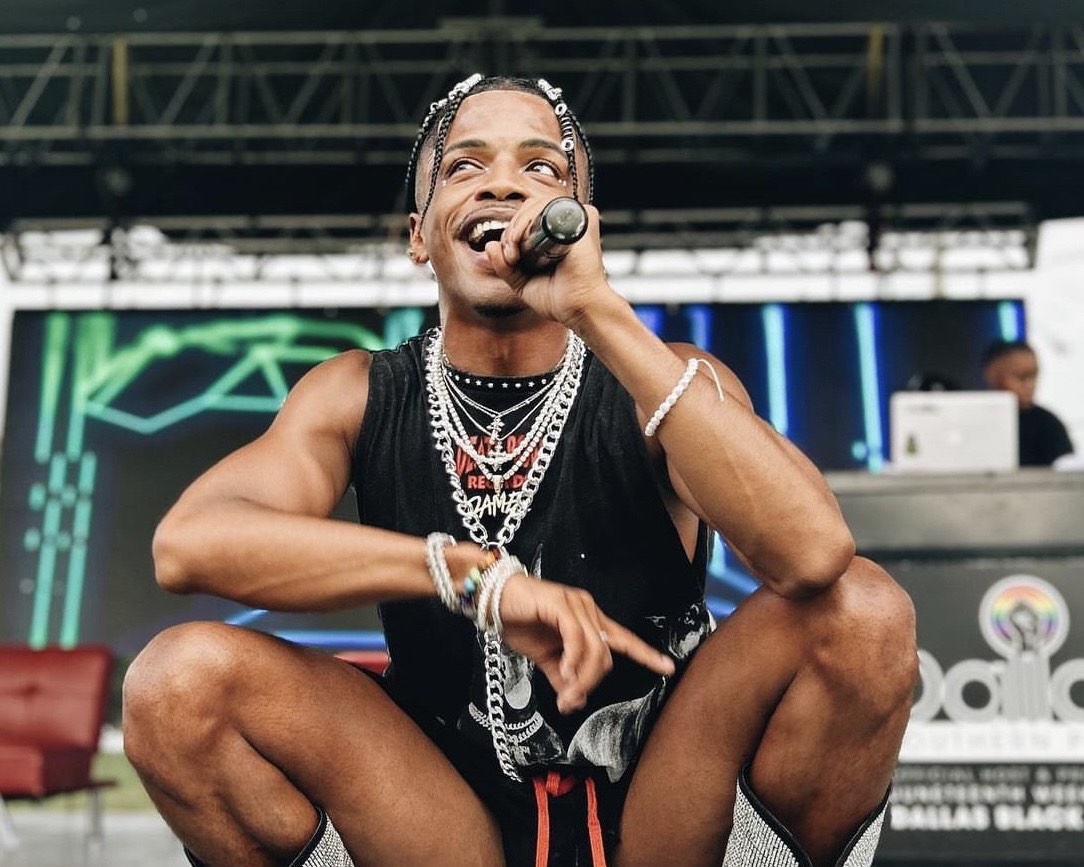
ATLANTA, Ga. – In ancient times, to refine gold, a craftsman would sit next to a hot fire with molten gold in a crucible, and he would skim out the dross that rose to the top of the molten metal. Like that fine, purified precious substance, hip hop star Damez is ready for the trial by fire to end, and the golden life to begin.
He says as much in his new album Hell Now, Heaven Later. Over the course of the 17 tracks, in a cavalcade of street poetry, Damez empties his closet of tragedy, racism, homophobia and struggles he has experienced in his young life.
“I am intentional on everything I do,” he tells me on the podcast Rated LGBT Radio. “Life was putting me through things I couldn’t ignore, I needed the record to serve … I needed to address the issues, the pain the trauma head on.”
At times raw, at times resolute, at times angry, the album stuns in its honesty. It is a testament to both being defeated, and also resolving to moving ahead with hope. Thus, the name Hell now, Heaven later.
His family moved to Atlanta when he was 6, born in Mississippi. Life was great, and his childhood was perfect. He was the kid with a thousand questions and wanted to know everything. He already adored Destiny’s Child even at that age– “I was a music kid,” he says.
His parents were divorced when he was in high school, but as difficult as that was, it was nothing compared to the horror coming. When Damez was a senior in high school, his brother, Ryan, close to him in age, and his best friend, was murdered. “They were back-to-back traumatic experiences that did a lot of damage to my soul, my happiness and my confidence.”
He describes his brother to me. “He was just the coolest, most down to earth, precious soul. He made you feel like you belonged, he had your back. It is a void I have been trying to fill for 12 years. No one knows you like your big brother does. No one has your back. That kind of loss changes the chemistry in your brain.”
His greatest champion was gone, but music was still there for him, however, as it always had been. He came out sexually to his family, which was not met at first with great acceptance. Depressed, lonely and defeated, he pulled through by creating songs. He loaded his closet, now that he was out of it, with studio equipment, and the rest, as he says, “was history.”
He is now a rapper, singer, dancer, songwriter, editor, creative director, and a rising star in music. With a focus on rap and R&B, he showcases his talents and versatility through an eclectic catalog of self-penned songs and choreography-heavy visuals and performances.
His world has been exploding with possibilities ever since.
He was named the “New Face of Atlanta’s Music Scene” by Out Magazine’s Pride edition in 2020, as well as Atlanta Magazine.
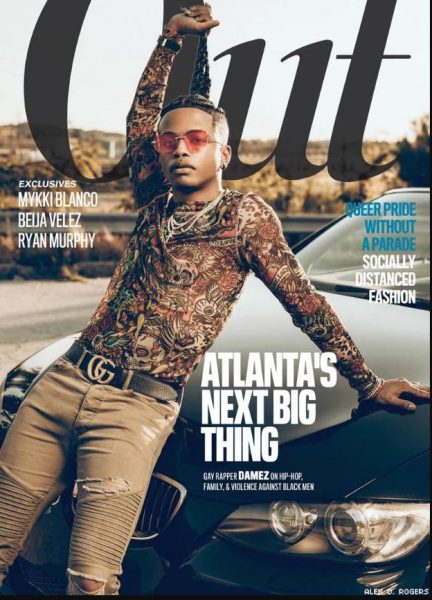
Photo of Damez by Alex D. Rogers
Out Magazine, in fact, put him on their cover.
In 2022, MTV News said Damez was ready to take the throne. He was featured on Billboard.com twice, as part of their ‘Billboard Pride’ playlist for his 2019 singles “Pull Up” and “Big Mood.” He’s performed for Atlanta’s Black Pride Festival in 2019, 2021, & 2022, as well as other notable performances such as 2021’s MOBI Fest, Human Rights Campaign’s HBCU Summit in 2019, and opening for original Dreamgirl Jennifer Holliday during NAESM’s 2020 Leadership Conference.
An advocate for equal rights and healthcare, he has participated in numerous campaigns for The Centers for Disease Control and Prevention and Gilead’s Truvada for PrEP Medication, among others.
More recently, he was featured in a 2022 campaign alongside Tina Knowes-Lawson and others for British multinational pharmaceutical ViiV Healthcare’s HIV campaign, ‘Me in You, You in Me’ to end HIV stigma and raise awareness on preventive medication.
His earliest work, that gained great popularity and play time in clubs, was full of tough talk, attitude and made him untouchable. It was, he now says, an armor that he has become willing to drop. “Today, that is not who I am and what I want my music to reflect.”
The album also does not hide his queerness, he is autobiographically vivid in who he is. “I had to analyze and accept that I was very different from my brothers at a young age. I could not go through life being someone I am not, but I did know it would not be easy.” He depicts the evolvement of his family accepting him from within an African American community that often did not.
He met with a lot of pushback in the Hip Hop world by being open about who he was. “I was told ‘no’, and certain artists would not work with me. Performance opportunities were being withheld even though I had better numbers than those on the bill. It was not something new. I had met these challenges before—in school and dealing with my family, so I knew I would be told ‘no’ a lot. Then there was the flip side. People are writing from all over the world. Kids are being inspired. Kids from different countries in Africa.”
“In the LGBTQ space, I am bringing Hip Hop—which is a widely multi-dimensional genre, and a lot of people don’t look at it that way, and don’t know it to be that.”
When Out Magazine put him on its cover, he was both thrilled, and scared being so revealed. “It came at an important moment for me, “ he says now. “I was struggling mentally at the time, and that cover was encouraging and gave me drive. My work was not in vain. It was a sign to not give up. I got right back in the studio, and my next EP was called COVER BOY. I suddenly realized that I had more influence than I thought I had. It all became bigger than me.”
“In the LGBTQ space, I am bringing Hip Hop—which is a widely multi-dimensional genre, and a lot of people don’t look at it that way, and don’t know it to be that. They have not heard enough Hip Hop in their lives to know how expansive it can really be. So that is another aspect I wanted to bring, the music I grew up with, introducing , exposing and showcasing the nuanced many different kinds of Hip Hop, the kinds that are embedded in my soul. There are so many different facets.”
As he brings Hip Hop to an audience that may feel the industry behind that genre doesn’t even like them, he is also introducing his R&B talents to the world. One cut, Stay Afloat, on the Hell Now album is Damez delivering sweet soulful melody.
It provides the silver lining to the fights depicted throughout the rest of the album. It is a song of vulnerability, and hope.
There is a point in the purification process where the fire has done its job. The imperfections are removed and the gold stand pure, shiny, glorious and ready to crown a regal head.
With all the power and good will Damez is generating, the bridges he is building, and all the new projects that are coming (“Things I can’t even talk about,” he tells me.), we can only hope that the hell he has experienced is slipping away and over.
Heaven does not have to wait, and if the inspiration from the album is an indication, it is not later.
It has arrived.
Related:
******************************************************************************************

Rob Watson is the host of the popular Hollywood-based radio/podcast show RATED LGBT RADIO.
He is an established LGBTQ columnist and blogger having written for many top online publications including The Los Angeles Blade, The Washington Blade, Parents Magazine, the Huffington Post, LGBTQ Nation, Gay Star News, the New Civil Rights Movement, and more.
He served as Executive Editor for The Good Man Project, has appeared on MSNBC and been quoted in Business Week and Forbes Magazine.
He is CEO of Watson Writes, a marketing communications agency, and can be reached at [email protected]
-

 Breaking News1 day ago
Breaking News1 day agoMajor victory for LGBTQ funding in LA County
-

 Features1 day ago
Features1 day agoKoaty & Sumner: Finding love in the adult industry
-

 a&e features4 days ago
a&e features4 days agoLatina Turner comes to Bring It To Brunch
-

 Books3 days ago
Books3 days agoTwo new books on dining out LGBTQ-style
-

 Television4 days ago
Television4 days ago‘White Lotus,’ ‘Severance,’ ‘Andor’ lead Dorian TV Awards noms
-

 El Salvador1 day ago
El Salvador1 day agoLa marcha LGBTQ+ desafía el silencio en El Salvador
-

 Miscellaneous9 hours ago
Miscellaneous9 hours agoCan you really find true love in LA? Insights from a queer matchmaker
-

 Arts & Entertainment10 hours ago
Arts & Entertainment10 hours agoIntuitive Shana gives us her hot take for July’s tarot reading

